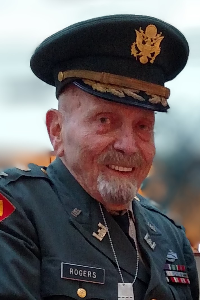


Col. Cranston Robinson Rogers, 99, of Medway, Mass., passed away on June 18, 2024 after a lifetime of service to the nation.
Chan was born February 10, 1925 in Charleston, S.C., the son of Francis Raymund and Laura Cranston (Robinson). After graduating from Orlando High School in 1943, he joined the Army Specialized Training Program, a military course that gave him a background in engineering before he left for Europe. Rogers was sent to the European Theater with the US Army 103rd Division, where, as part of the Allied forces in World War II, he distinguished himself through meritorious leadership, rising through the ranks to sergeant. On April 29, 1945, Rogers and his unit liberated the prisoners at Dachau. Upon his return to the United States, he was presented the Purple Heart for his injuries sustained during the War. Rogers stayed in the Army Reserve until 1978 where he rose to the rank of colonel.
Rogers, like many men in his family, attended The Citadel, the Military College of South Carolina, where he earned his degree in Civil Engineering and started a lifelong family affair with the institution. From Charleston he went to Boston where he managed to balance both earning a Master’s Degree in Civil Engineering from the Massachusetts Institute of Technology, and his first Civil Engineering endeavor of creating the six-lane elevated Central Artery (I-93).
Over the course of his illustrious civil engineering career, Rogers was a part of many innovative projects, including planning the first long-distance overland movement of a nuclear reactor to its plant site, design of the Dewey Square Tunnel which literally paved the path for Boston to be able to sustain the Big Dig. Rogers managed the largest, most complex tunnel-jacking project in the world. This section of road was the only part of the national highway system to be put underground—and was the widest vehicular tunnel in the world when it was built. Rogers was responsible for overseeing this specific initiative. In recognition of his work, he was named a Distinguished Member of the American Society of Civil Engineers.
After Hurricane Katrina hit in 2005, Rogers came out of retirement at age 80 and went to New Orleans to help residents and the Army Corps of Engineers dispose of the tremendous amount of storm-generated debris, continuing his lifelong service to the Corps.
Rogers spent many of his “retirement” years on the lecture circuit, speaking about his experiences in World War II and New Orleans. He joined fellow historians in speaking about the liberation of Dachau and the activities in the European Theatre. He was presented a number of awards from the international community and was a guest of the governments of Germany, France and Israel for his service during World War II.
It was during his service to the Boston Community that he met his future wife, Francine, to whom he was married for over 50 years.
Rogers is predeceased by his parents, Francis Raymund and Laura Cranston (Robinson), his wife, Francine, and his sons Michael and Rusty. Survivors include his children, Sarah, Zachary (Ana), Aleczander (Celia), Jackson, Benjamin (Meghan), Nicholas (Maija), Ammie (Carlos), and Chip, and eight grandchildren, Alexa, Taylor, Rylee, Emerson, Adalais, Eero, Leo, and another on the way.
Visitation at the George F. Doherty & Sons Funeral Home, 477 Washington St, Wellesley, on Wednesday, June 26, from 1-2:30PM with a service beginning at 2:30PM. If you are not able to make the services, then you are encouraged to please join us at reception to follow at Neeedham V.F.W. Post 2498, 20 Junction St. Needham. Interment at a later date in Arlington National Cemetery.
In lieu of flowers, donations may be made to either the Society of American Military Engineers, Boston Post (www.same.org/boston) or the Boston Society of Civil Engineers Foundation (www.bscesdonations.square.site).